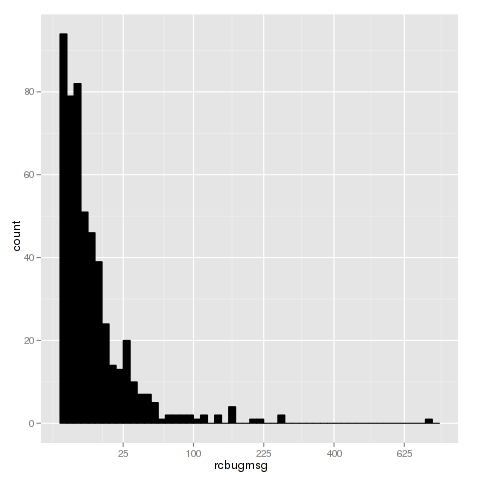Ulrich Dangel: Analyzing rc bug messages
Michael Stapelberg recently posted a blog post about looking into the number of Debian Developers actively working on RC bugs for the upcoming wheezy release.
In this blog post I analyze the data shared by Michael and provide the Analysis
After parsing the data file we typically want to get an understanding of the data, by using
R commands used to generate the plots & findings. If you are interested into looking into the data yourself, but don t like R, I suggest using ipython notebook + numpy instead.
Analysis
After parsing the data file we typically want to get an understanding of the data, by using summary(bugs) we get the minimum(1), median(5), mean(15.4), max(716) and quantiles of the data. This shows that the number of messages is wide-spread and a few people contribute a lot. To visualize the dispersion of the data we can create a box plot showing the range of messages:
 As the first and third quantile are close together we can assume that the majority of the work is done by a few, especially since the second quantile is 5. This is supported by the histogram below, where the x axis is the number of recorded messages and y is the number of developers.
As the first and third quantile are close together we can assume that the majority of the work is done by a few, especially since the second quantile is 5. This is supported by the histogram below, where the x axis is the number of recorded messages and y is the number of developers.

Top 10 contributors
The TOP 10 contributors, according to the dataset, are:
- Lucas Nussbaum - 716 messages
- Gregor Herrmann - 270 messages
- Jakub Wilk - 270 messages
- Andreas Beckmann - 225 messages
- Julien Cristau - 205 messages
- Cyril Brulebois - 169 messages
- Moritz Muehlenhoff - 162 messages
- Michael Biebl - 159 messages
- Salvatore Bonaccorso - 158 messages
- Christoph Egger - 142 messages
r commands
These are the commands used to generate the plots and information in this plot:
bugs <- read.csv("by-msg.csv")
summary(bugs)
boxplot(bugs$rcbugmsg, log='y', range=0, ylab="# bugs")
quantile(bugs$rcbugmsg)
0% 25% 50% 75% 100%
1 2 5 12 716
# create histogram
llibrary('ggplot2')
ggplot(bugs, aes(x=rcbugmsg)) + geom_histogram(binwidth=.5, colour="black", fill="black") + scale_x_sqrt()
top10 <- tail(bugs[order(bugs$rcbugmsg),], 10)
top10
- Lucas Nussbaum - 716 messages
- Gregor Herrmann - 270 messages
- Jakub Wilk - 270 messages
- Andreas Beckmann - 225 messages
- Julien Cristau - 205 messages
- Cyril Brulebois - 169 messages
- Moritz Muehlenhoff - 162 messages
- Michael Biebl - 159 messages
- Salvatore Bonaccorso - 158 messages
- Christoph Egger - 142 messages
r commands
These are the commands used to generate the plots and information in this plot:
bugs <- read.csv("by-msg.csv")
summary(bugs)
boxplot(bugs$rcbugmsg, log='y', range=0, ylab="# bugs")
quantile(bugs$rcbugmsg)
0% 25% 50% 75% 100%
1 2 5 12 716
# create histogram
llibrary('ggplot2')
ggplot(bugs, aes(x=rcbugmsg)) + geom_histogram(binwidth=.5, colour="black", fill="black") + scale_x_sqrt()
top10 <- tail(bugs[order(bugs$rcbugmsg),], 10)
top10
bugs <- read.csv("by-msg.csv")
summary(bugs)
boxplot(bugs$rcbugmsg, log='y', range=0, ylab="# bugs")
quantile(bugs$rcbugmsg)
0% 25% 50% 75% 100%
1 2 5 12 716
# create histogram
llibrary('ggplot2')
ggplot(bugs, aes(x=rcbugmsg)) + geom_histogram(binwidth=.5, colour="black", fill="black") + scale_x_sqrt()
top10 <- tail(bugs[order(bugs$rcbugmsg),], 10)
top10

 Playing the
Playing the  * Inspired by
* Inspired by  As already written, even though it seems, I didn't spend my time
running at Debconf12.
Or eating cheese...
Or (tentatively) hiking volcanoes...
Or helping people to kill each other with socks...
Or drinking beers...
Not *only* all of these (some of them at the same time, though hiking
a volcano while eating cheese and drinking beers is not particularly
easy)....but also some Debian work.
So, I uploaded a backport of samba to squeeze backports and our
squeeze users should now have the same samba version than wheezy ones.
I also stopped several cronjobs on i18n.debian.net and moved some
material there as links have been (or should be) moved to the brand
new i18n.debian.org (and its alias l10n.debian.org).
I did a major cleanup in
As already written, even though it seems, I didn't spend my time
running at Debconf12.
Or eating cheese...
Or (tentatively) hiking volcanoes...
Or helping people to kill each other with socks...
Or drinking beers...
Not *only* all of these (some of them at the same time, though hiking
a volcano while eating cheese and drinking beers is not particularly
easy)....but also some Debian work.
So, I uploaded a backport of samba to squeeze backports and our
squeeze users should now have the same samba version than wheezy ones.
I also stopped several cronjobs on i18n.debian.net and moved some
material there as links have been (or should be) moved to the brand
new i18n.debian.org (and its alias l10n.debian.org).
I did a major cleanup in  since most of the
since most of the 